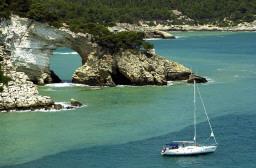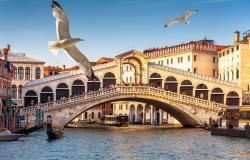The number of Italian beaches to be awarded a prestigious Blue Flag for clean water and pristine sands has risen once again this year, the international Foundation for Environmental Education (FEE) said Wednesday.
Italy can now boast 227 resorts that have passed FEE's strict tests for water quality and environmental management - 12 more than last year.
It remains fifth in Europe behind Spain and Greece, both with over 400, and Turkey and France with more than 200, said FEE, an NGO representing 58 countries in Europe, Africa, Oceania, Asia and America.
Italy now has 113 environmentally top-notch swimming beaches, nine more than last year and 17 more than 2006.
Tuscany and Marche topped the league for the second straight year, with each region boasting 16 awards, one more than last year.
They were joined by Liguria which added two Flags to last year's 14.
Abruzzo was steady with 13 while Campania earned one more Flag to claim 12.
Emilia Romagna had 8, like last year, while Puglia earned seven, up two, and Veneto earned one more to boast 6.
Sicily, Calabria and Lazio all gained one to stand on 4 while Friuli and Sardinia claimed two as in 2008.
Molise dropped from two to one, joining Basilicata at the bottom of the pile.
Both regions have small stretches of coastline, on the Adriatic and Ionian seas respectively.
Only two Italian lakes earned a Blue Flag: one in Piedmont and one, the Lago di Scanno, in Abruzzo.
While last year many Italian beaches failed to clinch the coveted symbol because of problems with waste disposal, this year they had greater success.
''The rise in the number of Blue Flags highlights the attention paid by several local administrations to an issue that is so relevant in our country today,'' said Carla Creo of the Italian Agency for New Technologies, Energy and the Environment, which promotes the Blue Flag programme in Italy.
Claudio Mazza, Secretary General of FEE Italia, said: ''We are sure that investing in environmental quality is the best way to develop a healthy and lasting tourism-based local economy''.
FEE examines thousands of beaches all over Europe every year, demanding that strict environmental criteria be respected before its Blue Flags can be displayed.
The criteria focus on water quality, environmental information and education, environmental management, safety, cleanliness, provisions for waste and recycling and strict zoning of different beach activities.









